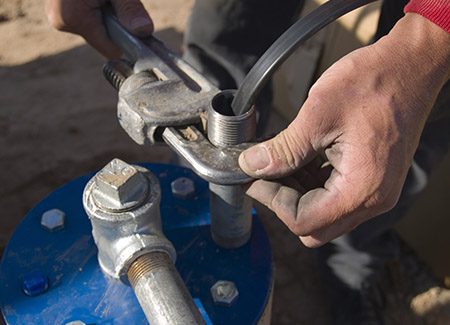Understanding the Secret Parts of Effective Water Filtering Solutions

Relevance of Water Filtering Systems
Water filtration systems play a critical function in guaranteeing access to tidy and risk-free drinking water by efficiently removing impurities and impurities. These systems are vital in addressing the expanding issues over water top quality and the prospective health and wellness risks related to consuming polluted water. By making use of various filtering devices such as reverse osmosis, activated carbon, and UV sterilization, water purification systems can efficiently eliminate dangerous materials like bacteria, viruses, hefty metals, and chemicals from the water.
Additionally, water purification systems help to boost the taste and smell of water by getting rid of chlorine, debris, and other pollutants that can influence its quality. Pump repairs & installation. This enhancement in water high quality not just makes it more palatable yet also urges people to drink an appropriate quantity of water daily, advertising better hydration and general health and wellness
Kinds Of Purification Components

Physical filters are designed to physically strain out pollutants from the water. These filters can be made from materials like ceramic, carbon, and even sand, and they function by trapping particles larger than the filter's pores as water travels through.
Chemical filters make use of various chemical processes to remove pollutants from the water. Instances include triggered carbon filters, which adsorb pollutants, and turn around osmosis membrane layers, which utilize stress to different pollutants from the water.
Organic filters use living microorganisms like microorganisms or algae to damage down raw material and contaminants in the water. These filters are commonly utilized in wastewater therapy plants or natural water purification systems.
Comprehending the different types of filtration components is crucial for selecting one of the most appropriate water filtration system for certain filtration demands.
Function of Sediment Filters
Debris filters play an important function in water filtering systems by properly recording strong bits put on hold in the water. These filters are commonly the first line of defense in a filtering system, getting rid of bigger fragments such reference as sand, silt, dust, and rust before the water moves via finer filtering stages. By trapping these debris, the filters avoid them from reaching downstream parts, therefore extending the lifespan and effectiveness of the entire system.
The feature of sediment filters is vital in keeping water high quality and safeguarding delicate devices from damage created by debris. In addition, by eliminating visible fragments, debris filters improve the clarity and preference of the water. On a regular basis Visit This Link cleaning up or changing sediment filters is essential to make sure optimal efficiency. Neglecting this upkeep can cause obstructing, reduced water flow, and compromised filtering effectiveness. Generally, debris filters are crucial components that contribute considerably to the efficiency of water filtering systems.
Function of Triggered Carbon Filters
Playing a crucial role in water filtration systems, activated carbon filters are instrumental in getting rid of contaminations and impurities from the water supply. As water passes via the filter, the triggered carbon draws in and holds onto the impurities, guaranteeing that the water that comes out on the other side is cleaner and safer for consumption.
Turned on carbon filters are very efficient at enhancing the taste and smell of water by lowering chemicals that can impact its high quality. They are also qualified of eliminating specific heavy steels like lead and mercury. In addition, these filters can assist prevent the build-up of microorganisms and algae in water, additional enhancing its total high quality. Due to their versatility and integrity, triggered carbon filters are a key part in guaranteeing that water is purified to the highest possible requirements before getting to consumers.
Recognizing Reverse Osmosis Solutions
Reverse osmosis systems are advanced water filtering systems that use a sophisticated procedure to remove pollutants and contaminations from drinking water. These systems work by applying pressure to the water, forcing it via a semi-permeable membrane layer. This membrane layer acts as an obstacle, permitting only pure water particles to pass through, while obstructing bigger molecules such as minerals, chemicals, and other contaminations. Because of this, the water that comes out beyond is considerably cleaner and safer for usage.
Additionally, reverse osmosis systems are relatively low-maintenance and can be mounted under the sink or in a main filtering system, offering convenient accessibility to tidy water throughout the home. In general, comprehending exactly how reverse osmosis systems work can aid people make notified decisions concerning their water filtering needs.
Verdict
In verdict, efficient water filtration systems are crucial for making certain risk-free and tidy alcohol consumption water. The essential elements of these systems consist of debris filters, activated carbon filters, and reverse osmosis systems. By comprehending the feature and duty of each part, individuals can make informed decisions when choosing a water purification system. It is essential to focus on the top quality of water in order to advertise overall wellness and well-being.
Water purification systems play an important duty in guaranteeing accessibility to tidy and Recommended Reading safe drinking water by successfully getting rid of contaminants and pollutants. By utilizing different purification mechanisms such as reverse osmosis, triggered carbon, and UV sanitation, water purification systems can efficiently eliminate dangerous materials like bacteria, viruses, heavy steels, and chemicals from the water supply.
Sediment filters play a vital role in water filtration systems by efficiently catching strong fragments put on hold in the water (Well Pump Replacement).Playing an essential function in water filtering systems, triggered carbon filters are critical in getting rid of contaminations and impurities from the water supply.Reverse osmosis systems are innovative water filtration systems that utilize an advanced process to eliminate pollutants and pollutants from drinking water